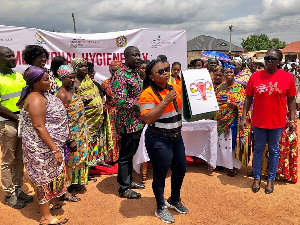 The event saw the launch of new educational materials on menstrual health
The event saw the launch of new educational materials on menstrual health
On May 28, 2024, AngloGold Ashanti celebrated World Menstrual Hygiene Day by distributing sanitary pads to girls in Obuasi and also educating them on menstrual hygiene.
In a welcome speech from Stella Frimpong, representing the Obuasi East District Chief Executive, she welcomed attendees and expressed gratitude to AngloGold Ashanti for organizing the annual program.
Frimpong highlighted the significance of the event and encouraged attendees to take the lessons on menstrual hygiene seriously.
Mavis Nana Yaa Kyei, the Social Development and Gender Superintendent of AngloGold Ashanti Obuasi Mine, emphasized the importance of menstrual hygiene at the 2024 Menstrual Hygiene Day durbar.
She highlighted that menstruation, though a natural process experienced by half the world's population, is still met with shame and inadequate access to hygiene products, particularly in developing countries.
Kyei underscored the United Nations Population Fund's (UNFPA) stance that menstrual health is a fundamental human right. She stated that inadequate menstrual hygiene resources worsen social and economic inequalities.
This year's theme, "Together for a #PeriodFriendlyWorld," aims to ensure access to menstrual products, education, and infrastructure, normalizing menstruation and reducing stigma.
AngloGold Ashanti has committed to promoting menstrual hygiene awareness and providing resources.
Initiatives include public education on radio and training sessions for Girl Child Coordinators in Obuasi.
During the durbar, health talks were held for Junior High School students to educate girls on menstrual hygiene and boys on supporting their female classmates.
The event also saw the launch of new educational materials on menstrual health. Kyei acknowledged the support of partners such as GIZ, the Ghana Health Service, local authorities, and the Ghana Education Service.
In her closing remarks, Kyei called for continued efforts to ensure menstruation does not hinder education, health, or dignity.
She urged all stakeholders to work together to break the silence, end the stigma, and secure resources for safe and hygienic menstrual management for everyone.
Hannah Amponsah, Regional Girls Education Officer for the Ashanti Region, announced that menstrual education will begin in senior high schools and stressed the importance of hygiene practices.
She highlighted the challenges girls face such as a lack of sanitary pads, which led to the creation of the Regional Pad Bank for public donations. These donations are distributed by district girls officers to those in need.
Amponsah emphasized that World Menstrual Hygiene Day includes both pad distribution and education on menstrual hygiene, urging men to support their partners during menstruation.
Kwabena Owusu Nketia, the District Education Director for Obuasi, revealed that while menstruation was historically stigmatized, education has shown its vital role in life. He urged everyone to adopt positive attitudes and practice what they learned during the program.
Kwabena Nketia thanked all attendees and AngloGold Ashanti for organizing the event to educate the youth.
Benedict Osei Kuffour, Senior Medical Officer at AGA Health Foundation, greeted attendees and explained that World Menstrual Hygiene Day is celebrated on May 28 to symbolize the average 28-day menstrual cycle and the typical five-day duration of menstruation.
She discussed how historical taboos around menstruation were initially meant to enforce hygiene and mentioned beneficial practices, like eating protein-rich foods such as eggs during menstruation.
Dr. Benedict Kuffour emphasized the importance of knowing one's cycle length, understanding that menstruation duration varies, recognizing the difference between regular and irregular cycles, and monitoring menstrual flow to identify normal or abnormal patterns.
She also demonstrated the use of different types of sanitary pads and stressed the importance of practicing personal hygiene during menstruation.
In an interview, Dr. Kuffour stated that the program's main goal was to provide accurate information about menstruation and menstrual hygiene.
She urged parents, teachers, and health officials to educate children about menstruation, helping them understand what constitutes a normal cycle and when to seek medical care.
Nana Nyanta Ware, representing Nana Serwaa Buruwa II, Akrokerri Hemaa, in her closing remarks, acknowledged the valuable teachings provided during the event.
She emphasized the importance of parents fostering strong relationships with their daughters to facilitate open communication, allowing children to express their concerns about menstruation.
Nana Nyanta urged parents to offer guidance and advice to their children, including abstaining from sex during menstruation to prevent teenage pregnancies. Additionally, she encouraged children to seek advice from their teachers during this time.
She also expressed gratitude to AngloGold Ashanti for organizing the program, which aims to educate more girls about the menstrual cycle.
Ellen Allatu, a student of Christ The King Senior High School, shared her first menstrual experience in an interview, highlighting the support she received from her mother during these periods.
She expressed gratitude for the valuable lessons learned from the program and thanked AngloGold Ashanti for educating teenagers about menstruation and providing free sanitary pads.